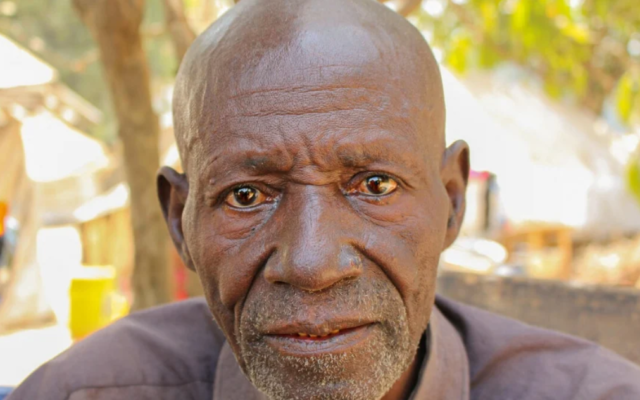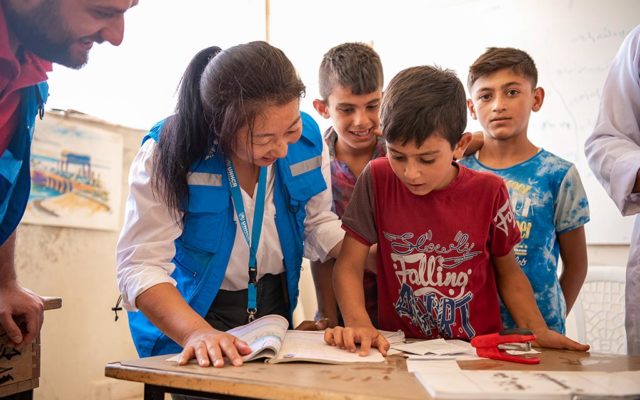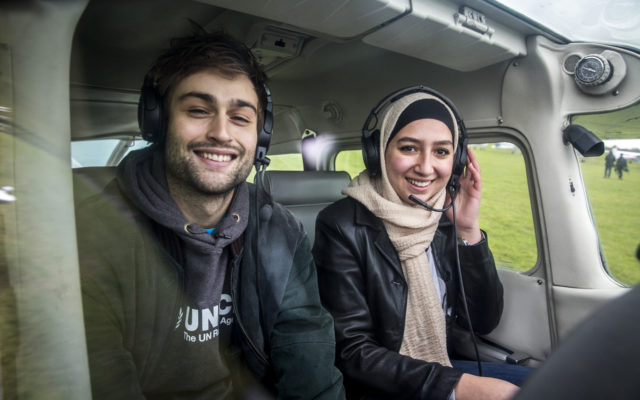Syrian families find a warm welcome in West Wales
“They accepted us and treated us as friends:” refugee family gives back by cooking meals for Cardigan care workers helping fight COVID-19.
© UNHCR / Andrew McConnell
A tranquil town on the mouth of the River Teifi in Cardigan, West Wales, has opened its arms to Syrian families whose lives have been shattered by the ongoing crisis in their home country.
Ahmad Alhamody, wife Enas and children Rimas, Yazin and Rhaghad fled Syria after a rocket struck near their home in Idlib and Ahmad suffered shrapnel wounds. Family members were arrested.
To stay in Syria would have meant Ahmad joining the military. They moved to Lebanon and were subsequently resettled by UNHCR, the UN Refugee Agency, under the UK’s Community Sponsorship scheme for refugees.
“Cardigan’s great, the people are friendly, the shopping’s good, the weather is fine. It’s a lovely home.”
When they arrived in Wales in 2019, Ahmad volunteered as a barber on his local high street, where everyone seems to know him. He now has a paid job there.
“The people here have been so good,” Ahmad said. “They accepted us and treated us as friends. What I’ve seen here I see nowhere else.”
Before the pandemic, Ahmad enjoyed watching the national sport of rugby and swimming in the local pool with the family. Enas has been writing and illustrating a Syrian cookery book and is planning to study to become a nurse.
“The help we have received here has been amazing, now I can do a lot of the things on my own,” Ahmad said.
More recently, the couple decided to give back to the community during lockdown by cooking Middle Eastern dishes and distributing them to staff working on the frontlines of the COVID-19 response at care homes for vulnerable and disabled locals. Ahmad said it was their way of thanking the UK and Cardigan for the welcome that they had received.
Community sponsorship enables local groups to band together and support a refugee family move into their area, helping them navigate unfamiliar daily tasks and offering friendship as they put down new roots. Sponsor groups have emerged all around the country – from the rural west of England to the heart of cities like Liverpool and London.
The scheme enables individuals to make a tangible difference to the lives of those forced to flee, and the Alhamodys are not the first refugee family that this Cardigan community has embraced.
In late 2017 Muhaned Alchik, his wife Naheda and their children also came to the area, by way of Lebanon, under the same Community Sponsorship scheme.
“I like everything in Wales. Cardigan’s great, the people are friendly, the shopping’s good, the weather is fine. It’s a lovely home,” Muhaned told UNHCR.
Muhaned has been attending college, studying building maintenance and construction. He hopes to find work as a carpenter and has been adding to his skills by volunteering with local businesses during the holidays, working at a local Bengali restaurant when shifts are available and tending an allotment. Naheda, who used to teach in Damascus, is studying English and considering teaching again in future.
The family were forced to flee Syria after family members were imprisoned. Muhaned worked in a travel agency in Syria and for a supermarket in Lebanon before being resettled to Wales.
Muhaned and Naheda have three children Shadi, 8, Sara, 9 and Hadi, 1. The two elder children are happy in school and have learned to speak both English and Welsh, as well as maintaining their Arabic.
Muhaned and Shadi have been playing for the local side, Maesglas Football Club. Shadi, a goalkeeper, claimed he had made “60 saves” the previous week. They follow the fortunes of Liverpool and Manchester United as well as Real Madrid.
Away from work and school, life is still punctuated by trips to the mosque on Fridays and meetings with friends in the area.
The driving force behind welcoming the families to West Wales has been Vicky Moller, a veteran activist. Vicky spent almost three years gathering and mobilising residents, forming a committee and charity and navigating the application process including arranging visits by the Home Office. Part of Vicky’s approach was to walk door-to-door in town and discuss the arrival with locals before they came. The learnings from the first family were applied to the second family which arrived in 2019.
“The generosity of people is both moving and breath-taking” she said. “Community sponsorship is a lovely thing to do, it’s very rewarding, it’s a little kernel of perfection but it’s too small in Britain. This is too good to waste. It should spread.”
Sponsorship groups start as a kind of support network but the ultimate aim is that the refugee family build autonomy as the months continue.
The community was so comfortable with the two families that they were close to agreeing to support a third family before the recent lockdown. That project can hopefully resume in the near future.
This article is abridged from an original by UNHCR. To read the full article, please visit the UNHCR UK website.




